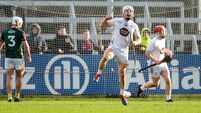The GAA's chilling nightmare scenario
Their brief is to catch people off guard by arriving unannounced, but they can’t turn up at your home or your place of work.
We’re talking about anti-doping officers who operate on behalf of the Irish Sports Council and, alien as it would have been not so long ago, drug-testing is now part and parcel of an inter-county player’s existence.














